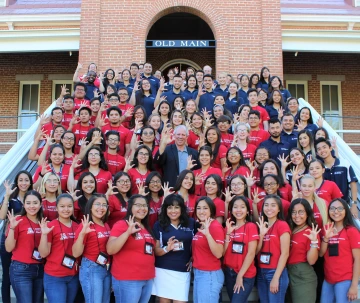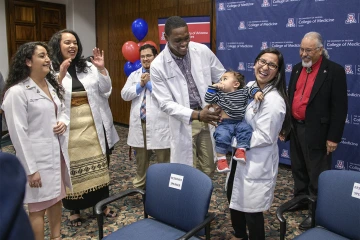Health Sciences Tools for Evaluating Bias, Expanding Cultural Sensitivity
The Office of Equity, Diversity and Inclusion is committed to increasing diversity and representation in health care.

Representation of diversity in health care to better serve diverse communities is a cornerstone of the Health Sciences Office of Equity, Diversity and Inclusion.
The past few weeks have seen calls throughout the country for solidarity with minority and marginalized communities that have faced discrimination throughout history. In a message to the Health Sciences community, Senior Vice President Michael D. Dake, MD, called upon faculty, staff and students to intentionally seek out diverse perspectives and to empathize and connect with one another.
Health Sciences Connect recently met with the Health Sciences Office of Equity, Diversity and Inclusion to learn more about how the office can provide assistance in accomplishing those important objectives.
What resources are available to help people who are thinking about their role in society right now?
The Health Sciences Office of Equity, Diversity and Inclusion has compiled a list of resources to help navigate these recent events and each person’s role in contributing to the status quo, including:
- Several implicit association tests created by Harvard University to help raise awareness of unconscious biases.
- A University of California System tool to recognize microaggressions and the messages they send, summarized by themes of assumptions and stereotypes.
- Guidelines for effective white caucuses offering practical exercises related to privilege and race relations, and qualities and expectations of a good ally.
- A list of materials to read, view, share and discuss that can help revise intrinsic colonist knowledge called 75 things white people can do for racial justice, and a list of antiracism resources, from organizations to research to podcasts.
What is the role of the Health Sciences Office of Equity, Diversity and Inclusion?

The Office of Equity, Diversity and Inclusion operates summer programs to expose students from diverse backgrounds to health care professions. This group attended the 2019 sessions. The 2020 summer programs are virtual.
One of the main programs for the office seeks to inspire and foster a pipeline of future health care professionals. The office is hosting various structured summer programs to introduce high school through graduate school students from diverse communities to various health care professions and health sciences research, so they can know what it takes to enter those fields, and be better prepared to compete for admission. This year those programs have been modified for virtual delivery.
Creating a diverse and talented pipeline of aspiring health professionals is critical to improving health disparities, said Lydia Kennedy, M.Ed., senior director of the office.
“When you have a practitioner or healthcare provider that represents you or understands you, the outcomes are better. So that's something that we really strive for. We want to be sure that there is representation in our halls, our faculty, staff and student body, and our providers, so patients feel comfortable receiving care and the outcomes improve,” Kennedy said.
How does the office work with the Health Sciences colleges?
The office supports the efforts and individuals charged with increasing diversity, equity and inclusion in the five Health Sciences colleges.

The University of Arizona Primary Care Physician Scholarship program aims to increase the number of physicians committed to working in Arizona’s underserved communities.
Each college approaches the work in its own way. The College of Medicine – Tucson and the College of Medicine – Phoenix have offices that focus on diversity, equity and inclusion. The College of Pharmacy, College of Nursing and the Mel and Enid Zuckerman College of Public Health have designated officers or committees that focus on diversity.
“We're also developing programming that serves the needs of all colleges. Whenever there's niche or a mission that is not college- specific, we will help host those kinds of events or support those kinds of activities. Most of them are outreach activities or campaigns, or education and engagement programming,” Dr. Moreno said.

